
Filipino is a language under the Austronesian language family. It is the national language of the Philippines, lingua franca, and one of the two official languages of the country, with English. It is a standardized variety of Tagalog based on the native language, spoken and written in Metro Manila, the National Capital Region, and in other urban centers of the archipelago. The 1987 Constitution mandates that Filipino be further enriched and developed by the other languages of the Philippines.

SIL International is an evangelical Christian nonprofit organization whose main purpose is to study, develop and document languages, especially those that are lesser-known, in order to expand linguistic knowledge, promote literacy, translate the Christian Bible into local languages, and aid minority language development.
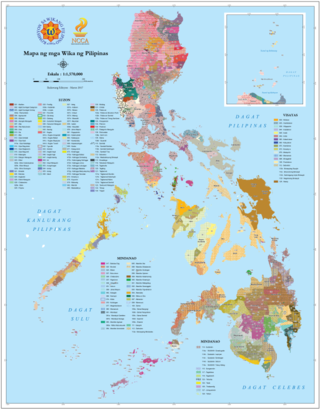
There are some 130 to 195 languages spoken in the Philippines, depending on the method of classification. Almost all are Malayo-Polynesian languages native to the archipelago. A number of Spanish-influenced creole varieties generally called Chavacano along with some local varieties of Chinese are also spoken in certain communities. The 1987 constitution designates Filipino, a standardized version of Tagalog, as the national language and an official language along with English. Filipino is regulated by Commission on the Filipino Language and serves as a lingua franca used by Filipinos of various ethnolinguistic backgrounds.
Philippine English is a variety of English native to the Philippines, including those used by the media and the vast majority of educated Filipinos and English learners in the Philippines from adjacent Asian countries. English is taught in schools as one of the two official languages of the country, the other being Filipino, a standardized form of Tagalog. Due to the influx of Philippine English teachers overseas, Philippine English is also becoming the prevalent variety of English being learned in the Far East as taught by Filipino teachers in various Asian countries such as South Korea, Japan, and Thailand among others. Due to the highly multilingual and bilingual nature of the Philippines, code-switching such as Taglish and Bislish is prevalent across domains from casual settings to formal situations.

The Philippine languages or Philippinic are a proposed group by R. David Paul Zorc (1986) and Robert Blust that include all the languages of the Philippines and northern Sulawesi, Indonesia—except Sama–Bajaw and the Molbog language—and form a subfamily of Austronesian languages. Although the Philippines is near the center of Austronesian expansion from Taiwan, there is little linguistic diversity among the approximately 150 Philippine languages, suggesting that earlier diversity has been erased by the spread of the ancestor of the modern Philippine languages.
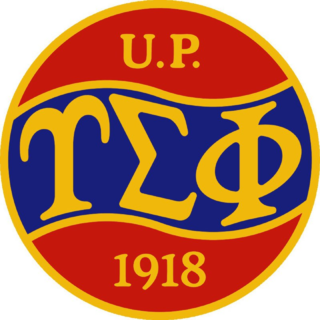
The Upsilon Sigma Phi (ΥΣΦ) is the oldest Greek-letter organization and fraternity in Asia. Founded in 1918, it is also the oldest student organization in continuous existence in the University of the Philippines. It has two chapters—a single chapter for the UP Diliman and the UP Manila campuses, and another for the UP Los Baños. Membership remains exclusive to UP students, and is by invitation only.
Mariveleño is a Sambalic language. It has around 500 speakers and is spoken within an Aeta community in Mariveles in the Philippines.

Adel Abbas Tamano is a Filipino lawyer and educator. He is the current Chief Administrative Officer, Chief of Humans Resources, and Corporate Secretary of DITO Telecommunity Corporation. He gained prominence as the spokesperson for the United Opposition party in 2007 and was part of the senatorial lineup in 2010.
The Meso-Cordilleran languages are a group of languages spoken in or near the Cordillera Central mountain range in Northern Luzon. Its speakers are culturally very diverse, and include the lowland Pangasinense, the Igorot highlanders, and Alta-speaking Aeta groups.

The Sama–Bajaw languages are a well-established group of languages spoken by the Sama-Bajau peoples of the Philippines, Indonesia, and Malaysia.
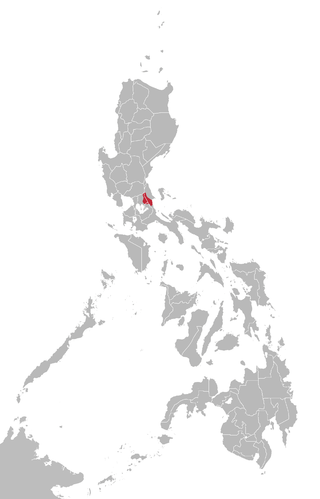
Remontado, also known in literature as Sinauna, Kabalat, Remontado Dumagat, and more commonly by the autonym Hatang-Kayi, is a Malayo-Polynesian language spoken in Tanay, Rizal, General Nakar, Quezon, Rodriguez, Rizal and Antipolo, in the Philippines. It is one of the Philippine Negrito languages. It is a moribund language.
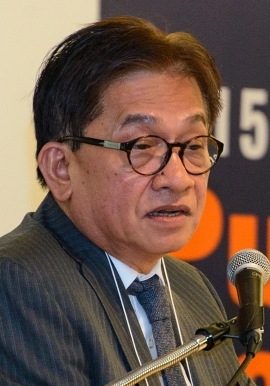
Dante B. Canlas is a Filipino economist and a professor at the UP School of Economics at the University of the Philippines Diliman. He served as Socio-Economic Planning Secretary and concurrently Director-General of the National Economic and Development Authority from 2001 to 2002 under President Gloria Macapagal Arroyo. Dr. Canlas was also the Executive Director of the Asian Development Bank (ADB) for Kazakhstan, Maldives, Marshall Islands, Mongolia, Pakistan, and the Philippines from 2003 to 2004.

Vladimir Afanasyevich Makarenko was a Russian orientalist, linguist, lexicographer, and translator.

The Bukid language, Binukid or Bukidnon, is an Austronesian language spoken by indigenous peoples of Northern Mindanao in the southern Philippines. The word Bukid means 'mountain' or 'highland' while Binukid means 'in the manner, or style, of the mountain or highland'. In Bukidnon province, it is referred to as Higaonon.
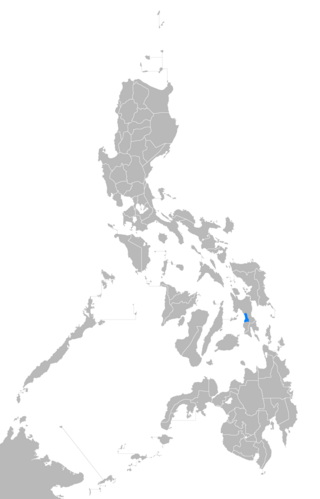
The Baybay language, also known as Baybayanon, Utudnon, Waya-Waya or Leyte, is a distinct regional language that was spoken on the island of Leyte in the Philippines before the arrival of Waray and then later, Boholano and Cebuano. It is still spoken around the city of Baybay. It is part of the Bisayan language family and is closely related to other Philippine languages.
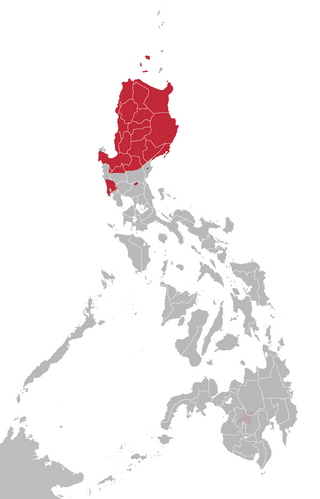
The Northern Luzon languages are one of the few established large groups within Philippine languages. These are mostly located in and around the Cordillera Central of northern Luzon in the Philippines. Among its major languages are Ilocano, Pangasinan and Ibanag.
Marilu Rañosa Madrunio is an applied linguist. Her works have been published in various international publications on World Englishes, Philippine English, English sociolinguistics, English language education and Forensic Linguistics.
The Central Cordilleran languages are a group of closely related languages within the Northern Luzon subgroup of the Austronesian language family. They are spoken in the interior highlands of Northern Luzon in the Cordillera Central mountain range.

The Asociación Feminista Filipina or AFF was a Filipino women's organization, founded in 1905. It was the first women's organization in the Philippines. The objective of the organization was the betterment of women's well-being regardless of class.














